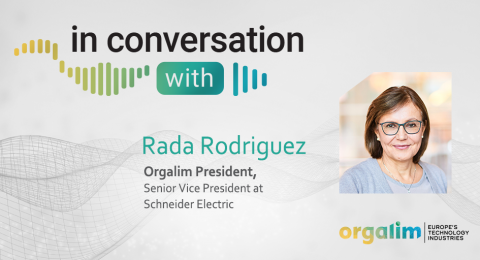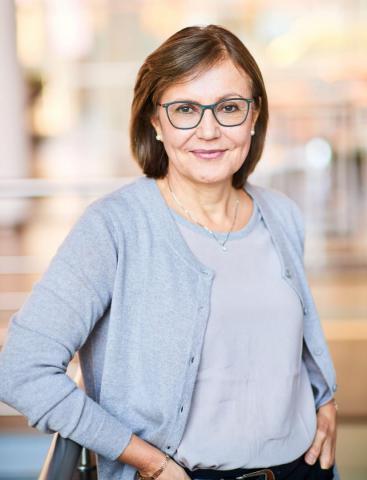In conversation with Rada Rodriguez
5 December 2019

In November Orgalim welcomed its new President: Rada Rodriguez, Senior Vice President at French electrical engineering giant Schneider Electric. Passionate about her industry and brimming with energy for the challenges ahead, she has arrived in the role determined to make an impact. After qualifying as an engineer in her native Romania, she went on to work for technology firms in Sweden, France and then Germany where she is based today. A true European, Rada speaks no fewer than six languages – although we limited ourselves to one as we sat down together to talk about her journey so far and her plans what the future holds as she takes the helm at Orgalim…
Congratulations on your appointment as Orgalim President! Perhaps you can tell us a little about why you chose to take on this role – and why now?
I have been politically interested all my life. Politics has a huge impact on how we live and work – positive or negative. I have always believed that by engaging, we can change it to be something positive. So when I was given the chance to join Orgalim, an organisation that represents such a big part of European industry, I jumped at the chance to play my part in accelerating positive change.
And why now? Well I am convinced we are at a critical moment in our history. On the one hand, the EU is welcoming a new Commission and a new Parliament; on the other, European industry is in a time of disruption – both due to technology and the political environment. We need to join together every possible positive force to unlock the great potential of this disruption. It is a moment of huge opportunity and one where our industries can make an enormous contribution, so I’m very grateful to have been entrusted with this role at this time.
What has your journey been to arrive at where you are today?
Back when I was growing up in Romania, there were basically only two careers to choose from: either you became a doctor or an engineer. So I became an engineer not quite by choice, but determined to give it my all. I started my career in Sweden, working from the ground up – from technical consulting to eventually leading projects myself. Then I made the move from consultancy to business at another company and started again, this time focusing on business and marketing and taking evening classes to broaden my skills. I developed my management experience over the years, and when the company where I worked was acquired by Schneider Electric I launched myself on the path to the career I have today – leading first an R&D site, then a line of business in a newly created business unit and then full country organisations: I was in charge of Schneider Electric Germany for six years, and then Schneider Electric Central and Eastern Europe before moving to corporate strategy, which is where I am today.

That’s quite a journey! And your career has taken you all over Europe – what has being European meant to you over the years?
Europe and being European has played a crucial role in my life. From an early age I experienced the rich diversity of this part of the world: raised in a family very open to different cultures, in a city with three nationalities – Romanian, Hungarian and German – where at school the kids played together in three languages. As an adult, my work has taken me from Romania, to Sweden, to France and now Germany. All cultures with their own characters and differences, but all places where a shared European mentality has helped me feel at home. The possibility to live and work in many places has opened many doors for me in terms of my career. Of course it helps to be able to speak several languages too!
At the Orgalim General Assembly you presented your priorities for your Presidency – what will be top of your agenda?
Building on the work of the Orgalim secretariat and working groups in support of EU industrial strategy and a European Green Deal, I have chosen to focus on four transversal areas for my Presidency. First, to strengthen Europe’s innovation ecosystems: helping smaller companies scale up and grow within Europe so that today’s start-ups can become tomorrow’s innovation champions. Second, as the impact of demographic change and technology transformation make themselves felt, we need to make sure Europe’s workforce is fit for the future. Here I would like to foster a discussion on issues like workforce mobility, diversity and upskilling that is rooted in business reality and the angle of competitive advantage.
The third horizontal focus area is unlocking the full potential of new business models linked to digitalisation, looking in particular at issues like data. And my fourth objective is to continue building bridges between Orgalim and other organisations in Europe to strengthen our position as the voice of our industries. These are priorities where I believe my personal experience can add particular value, complementing and reinforcing the expertise across Orgalim’s working groups and secretariat.
As the new Commission takes office, all eyes are on their plans for the ‘first 100 days’. What about your first 100 days as Orgalim President – what actions have you been prioritising?
Looking to the objectives around ecosystems, the future workforce and digitally-driven business models, these are more mid- to long-term. So in the short term, during the first 100 days, my personal goal is to really reinforce synergies with key industry sectors in achieving our shared priorities. I am reaching out to the partners on the European stage that are relevant to us, so we can start working together to create a roadmap that will enable us to deliver on the longer-term objectives in the months and years ahead.
The biggest and most beneficial impact will come from recognising the positive role the technology industries will play in Europe’s future – that we as an industry are part of the solution, visibly generating value for Europe’s citizens.
Another big talking point in Brussels in recent months has been the improved gender balance within the Commission. As a successful businesswoman in what is traditionally seen as a male-dominated industry, how have you seen things change over your career?
It’s an interesting question, and one that I think cuts across sectors. In my early life I barely thought about it: perhaps the only positive feature of the Communist system I grew up in was that there was no difference drawn between the genders. My mother and even my grandmother worked all their lives, and in my school class of 36, 30 became engineers – girls and boys. It was only later in my career that I started noticing more these differences. And indeed, I have often had the experience of being the only woman in the room. A lot has changed over the years, particularly the awareness that diversity is good for creativity and productivity. But I think women still have to fight to make their voices heard, so we have work to do as a society to change this.
If you could share one message with President von der Leyen and her team as they launch into the new legislative term, what would it be?
I think the biggest and most beneficial impact will come from recognising the positive role the technology industries will play in Europe’s future – that we as an industry are part of the solution, visibly generating value for Europe’s citizens. If we can adopt this mindset at the political level and align society around this too, we can unlock the full potential of technological innovation to solve the greatest challenges we face.